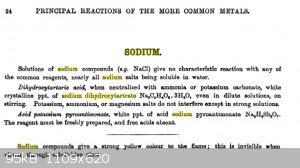atomicfire
Harmless

Posts: 37
Registered: 7-2-2011
Member Is Offline
Mood: shaprening my molecular scissors
|
|
Removing sodium from a solution
Hi all,
Long time reader seldom poster here looking for a little advice.
I have a solution that is a waste product from a process that I need to dispose of. The problem is that the solution is concentrated and contains
high levels of sodium ions in solution. I want to remove as much of the sodium as possible.
One big problem is that once the solution cools, it gets so vicous that it renders itself unusable. Dilution is something I need to stay away from as
much as possible but if that's the only way then I can go that route.
I was thinking of trying to react it with HCl but I don't know if I can get the salt out.
Any suggestions? What are other ways of removing metal ions from a solution?
ban DHMO
|
|
|
Loptr
International Hazard
    
Posts: 1348
Registered: 20-5-2014
Location: USA
Member Is Offline
Mood: Grateful
|
|
Depending on the situation you have going on there, you will most likely have to resort to the solubility (or limited solubility) of your compounds of
interest in various solvents in order to separate them.
You need to provide more information about your solution, such as the solvent(s) involved and its solvated contents.
[Edited on 11-5-2015 by Loptr]
|
|
|
Amos
International Hazard
    
Posts: 1406
Registered: 25-3-2014
Location: Yes
Member Is Offline
Mood: No
|
|
If it's something you've deemed necessary of disposal, I'd be more worried about what kinds of anions you're dealing with, rather than sodium being
problematic.
|
|
|
aga
Forum Drunkard
    
Posts: 7030
Registered: 25-3-2014
Member Is Offline
|
|
What Volumes are involved ?
Is this a home chemistry experiment (<1 litre solution) or an Industrial requirement ( > 1000 litres) ?
|
|
|
blogfast25
International Hazard
    
Posts: 10562
Registered: 3-2-2008
Location: Neverland
Member Is Offline
Mood: No Mood
|
|
One of the most insoluble sodium compounds is sodium antimonate (Na2SbO3 hydrate).
|
|
|
WGTR
National Hazard
   
Posts: 971
Registered: 29-9-2013
Location: Online
Member Is Offline
Mood: Outline
|
|
Sodium dihydroxytartrate and acid potassium pyroantimonate
Used for estimation of sodium in solution:
https://books.google.com/books?id=STM9AAAAIAAJ&pg=PA24&a...

[Edited on 5-12-2015 by WGTR]
|
|
|
phlogiston
International Hazard
    
Posts: 1379
Registered: 26-4-2008
Location: Neon Thorium Erbium Lanthanum Neodymium Sulphur
Member Is Offline
Mood: pyrophoric
|
|
reverse osmosis
ion exchange
Depending on what you want to separate the sodium from (ie the other stuff in the solution), other options may exist (eg. dialysis if you the other
molecules are large).
I don't understand why you are focusing on the sodium? Presumably, it is not a harmful component of your waste (unless it is sodium-22).
[Edited on 12-5-2015 by phlogiston]
-----
"If a rocket goes up, who cares where it comes down, that's not my concern said Wernher von Braun" - Tom Lehrer |
|
|
macckone
Dispenser of practical lab wisdom
    
Posts: 2168
Registered: 1-3-2013
Location: Over a mile high
Member Is Offline
Mood: Electrical
|
|
Knowing what else is in the solution is necessary to know how to remove unwanted components.
|
|
|
Steam
Hazard to Others
  
Posts: 238
Registered: 25-3-2014
Location: Minnesota
Member Is Offline
Mood: Triple Point
|
|
try using crown ethers. Depending on the size of the crown ether you can move the appropriate ion to an organic phase.
DISCLAIMER: The information in this post is provided for general informational purposes only and may not reflect the current law in your jurisdiction.
No information contained in this post should be construed as legal advice from the individual author, nor is it intended to be a substitute for legal
counsel on any subject matter. No reader of this post should act or refrain from acting on the basis of any information included in, or accessible
through, this post without seeking the appropriate legal or other professional advice on the particular facts and circumstances at issue from a lawyer
licensed in the recipient’s state, country or other appropriate licensing jurisdiction.
|
|
|
Hawkguy
Hazard to Others
  
Posts: 326
Registered: 10-10-2014
Location: British Columbia (Canada eh!)
Member Is Offline
Mood: Body is Ready
|
|
Try adding a solvent that renders the Sodium insoluble... Alcohol gets rid of the Sodium Sulfate, Carbonate, Cyanide and some others in solution..
|
|
|